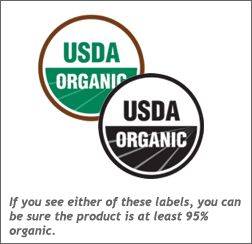|
It’s a question that gets asked a lot. What is the difference between organic and non-organic food? Is it really worth the added expense? How do you know if something is really organic or if you’re getting duped? This article will provide some answers to these commonly asked questions and shine some light on this shady area of food production.
In Canada, the job of ensuring our food and food policies represent the highest possible safety standards for Canadians is shared by the Health Canada and the Canadian Food Inspection Agency. In the matter of organic foods and food products, the CFIA has set rigorous standards of practise and production.
The Government of Canada Regulations Board describes organic food production as “a holistic system designed to optimize the productivity and fitness of diverse communities within the agro-ecosystem, including soil organisms, plants, livestock and people. The principal of organic production is to develop enterprises that are sustainable and harmonious with the environment.”
“Organic production is based on principles that support healthy practices. These principles aim to increase the quality and durability of the environment through specific management and production methods. They also focus on ensuring the humane treatment of animals.”
The general principles of organic production include the following:
- Protect the environment, minimize soil degradation and erosion, decrease pollution, optimize biological productivity and promote a sound state of health.
- Maintain long-term soil fertility by optimizing conditions for biological activity within the soil.
- Maintain biological diversity within the system.
- Recycle materials and resources to the greatest extent possible within the enterprise.
- Provide attentive care that promotes the health and meets the behavioural needs of livestock.
- Prepare organic products, emphasizing careful processing, and handling methods in order to maintain the organic integrity and vital qualities of the product at all stages of production.
- Rely on renewable resources in locally organized agricultural systems.
Organics Translated
In the simplest of terms, organic produce and animal products are raised without the use of synthetic chemicals (pesticides, herbicides, fungicides) and with the health of the land and animals held as paramount as the health of the consumer. In the grocery store this extra care and attention translates into about a 20% increase in the price of organic food over non-organics.
The Real Cost of Food
When you consider the hidden expenses of non-organic foods the extra money added to your weekly grocery bill may be worth it to you.
- Many chemical and synthetic herbicides, fungicides and pesticides sprayed on food crops have been linked to various cancers, with greater exposure creating greater risk over time.
- Certain pesticides have been linked to the rise of estrogen-like compounds found in both men & women, disrupting natural hormonal balance and contributing to a variety of health concerns including low testosterone in men and increased menopausal symptoms in women.
- Conventionally grown fruit and vegetables have been scientifically proven to be losing their nutritional value over time, delivering less anti-oxidant vitamins and minerals to your plate.
- Antibiotics and growth hormones routinely used in livestock production remain in the flesh and fat of animals and get passed up the food chain, increasing toxicity to human consumers.
- Man-made food products commonly found in non-organic packaged goods like high fructose corn syrup has been linked to the dramatic rise in degenerative diseases such as type II diabetes, obesity and heart disease.
Certified Organic
The CFIA designates particular Certification Bodies responsible for granting organic status to food products, in accordance with the standards set out in Canada’s Organic Product Regulations. Foods meeting the requirements may call themselves Organic and display the logo created for this purpose by the federal government. Multi-ingredient packaged goods containing 95% organic ingredients may also call themselves Organic and display the logo. Multi-ingredient packaged goods containing less than 95% organic ingredients may not use the Organic designation or logo but may list organic ingredients on their packaging.
Foods imported from other countries may be inspected by a Canadian affiliate organization and granted Organic status per Canadian regulations, or they may have been granted organic status under regulations set out in their own country and bear the logo of that country.
 
Organics: The Bottom Line
Buying organic fruit, vegetables, meat, poultry and dairy products is about more than blazing a new trail or following the herd. Buying organic is really about living your values. Ask yourself a few meaningful questions: How important is my health and taking preventative action to prevent disease? How do I feel about preserving the environment I live in for my own benefit and for generations to come? Does it matter to me how the animals I eat were treated before they ended up on my plate? Do I expect my food to provide a high level of vitamins, minerals and anti-oxidant nutrients?
If you answered yes to these questions then buying organic is an opportunity for you to use your consumer dollars to make a statement about what matters most to you, to live your values and connect with others who share the same views.
Making it Happen
For many the transition to organic eating is gradual over time. Like any change, making different food choices is comfortable when done at an individual pace. If budget is a real concern for you then channel your grocery dollars wisely. Buying organic meats, poultry and dairy products are the most costly but hugely beneficial, as toxins (from pesticides, antibiotics and growth hormones) are concentrated in animal products and passed up the food chain to human consumers. If you are more of a herbivore then pay special to the “dirty dozen”, an affectionate name given to the twelve most heavily contaminated fruits and veggies on the market today: celery, peaches, strawberries, apples, blueberries, nectarines, bell peppers, spinach (includes kale and collard greens), cherries, potatoes, grapes and lettuce. As you settle into your new way of eating, seek out local butchers, farmers markets and food shares. In doing so, you will establish connections with others in your community who share the same values you do; to live and eat as part of a holistic system that includes the soil, plants, livestock and people.
Resources
Organic Production Systems Production and Management Standards by the Government of Canada, Canadian General Standards Board
Canada Food Inspection Agency
The National Post, June 1, 2010 - 'Dirty Dozen' Fruits and Vegetables are the most Chemically Contaminated |

 Heart health, done naturally, is delivered in this unique combination of products. The foundation is knowledge - David Rowland’s “The Nutritional Bypass” - and then optimal heart health is built on three key products that can reset and maintain it.
Heart health, done naturally, is delivered in this unique combination of products. The foundation is knowledge - David Rowland’s “The Nutritional Bypass” - and then optimal heart health is built on three key products that can reset and maintain it.











